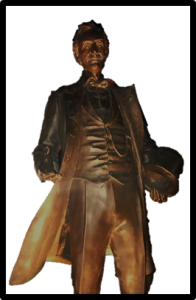On Feb. 24, the first performance of a cantata, written by Black Chicagoan composer Florence Price, premiered in Springfield, Illinois. The lines of “Abraham Lincoln Walks at Midnight” – a poem about Lincoln written by Springfield native Vachel Lindsay – inspired Florence Price greatly. Thought lost to time, Florence’s musical manuscript was discovered in 2009 during a home renovation, on a property on the outskirts of Chicago. It was exceptionally fitting for the cantata’s chorus and orchestra to debut in the town where both infamous men once lived.
The poem by Vachel Lindsay, set to the masterpiece of Florence Price’s work, speaks to both of their individual talents while acknowledging their distinct struggles. Price created more than 300 known works, ranging from songs and chamber music to other composed pieces; however, most were thought to be lost upon her death in 1953. Three copies of “Abraham Lincoln Walks at Midnight” were recovered from Price’s former summer residence – chorus with piano accompaniment, a portion for orchestra only, and the recently premiered musical masterpiece, with both orchestra and chorus renditions. Vachel Lindsay’s poem, which inspired such inspiration in Price, was created with his unique style of “singing-poetry” and speaks on timeless themes such as war, grief and peace. Lindsay imagines within his poem that Lincoln is restless and walks, mourning and bitter from current events unfolding in Lindsay’s lifetime, until dawn’s light.
 Lindsay’s stanzas still reflect well a sentiment shared by many, even in the present day. The idea was that former leaders, who thought they were choosing what was best in their respective eras, would be distraught and dismayed at current events unfolding globally. Lindsay’s poem explores how Lincoln could not “…sleep upon his hillside now…” due to how he reflects upon “…the pain…” and it would seem Lincoln finds “…that all his hours of travail here for men seem yet in vain…” wandering Springfield restless due to the events causing World War I. One wonders if now, due to global events which call into question how human rights are defined, if both Lincoln and Lindsay stroll solemnly every night.
Lindsay’s stanzas still reflect well a sentiment shared by many, even in the present day. The idea was that former leaders, who thought they were choosing what was best in their respective eras, would be distraught and dismayed at current events unfolding globally. Lindsay’s poem explores how Lincoln could not “…sleep upon his hillside now…” due to how he reflects upon “…the pain…” and it would seem Lincoln finds “…that all his hours of travail here for men seem yet in vain…” wandering Springfield restless due to the events causing World War I. One wonders if now, due to global events which call into question how human rights are defined, if both Lincoln and Lindsay stroll solemnly every night.






